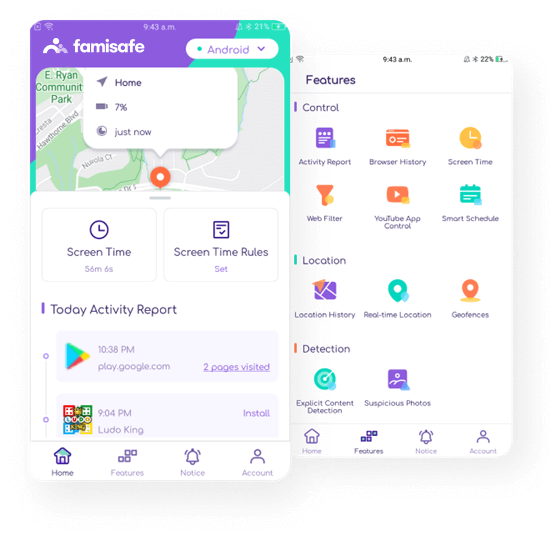Is This Normal Teeange Behavior and How to Deal With It?
Is This Normal Teeange Behavior?
ALL TOPICS
- YouTube Parental Control
-
- How to see your YouTube history?
- What is Metaverse? Parent Guide
- Put parental controls on YouTube
- Delete TikTok Account without Phone Number
- Ways to block YouTube channels
- Ways to Get Somone's IP Address and Hide IP Address
- A complete guide on YouTube parental control
- What is Fanfiction? Parents Guide
- Kids safe YouTube alternative
- Top 5 TikTok Alternatives
- Methods to restrict YouTube adult content
- Social Media App Parental Controls
- Parental Control Tips
Sep 11, 2024 Filed to: Parent's Guide Proven solutions
Human life revolves around many phases of growth. We start out as charming little babies and grow into curious toddlers, preschoolers, mid-aged kids, craving to learn more about the surroundings. After we quench this innocent curiosity, we blossom into adulthood and this is the most trying and misunderstood phase in the human growth cycle.

The stage as we all know is puberty/adolescence/teenage, and from a general view, we can still classify these special folk as young adults. Puberty starts at age 10 and will last for 10 years at most. In rare cases, the onset of puberty is likely to be age 8. There is no intent to point fingers at all young adults because we have all been through this stage. We can recall a thing or two about it, together with the trivial things that took place and how we handled them. However, what remains of essence is the approach we learned from our parents. During all stages of growth, parents have an enormous obligation to respond with the right attitude as normal teenage behavior shows. All adolescents require a keen monitoring eye on their behavior because of how they think, act, and what they say reflects their physical and psychological health.

Is this normal teenage behavior? How to deal with it?
So, as guardians, we do not know what to expect from our youngsters and we can't use our prior experiences as determining factors because individuals have unique growth patterns. Expect to see these sudden behavioral changes from your teenager, but you need not panic if you know the way to handle them.
- Anxiety and verbal aggression
Adolescents experience a wave of body changes yet coming into this acceptance may take time. In the event, they usually struggle to figure out what’s happening to them. Their basic response would be an exhibition of negative anxiety traits such as shyness, hostility, self-pity, or withdrawal. When having a conversation with friends or parents, they may show aggression in their speech, and sometimes they can also lash out or curse.
How to deal with it?
You can strike a balance with communication but not too much as it is annihilating. Especially to the teens who feel you are judging and intruding in their private matters which they are struggling to understand. You’ll realize that they want to spend more time on their own. Don’t take this freedom away, on the contrary, buy them literature, audio, and visual material that does not have a blunt approach to this stage. Strategize by investing in books, movies, and songs that can shape their thinking into more positive traits such as confidence, self-control, patience, listening, stress management, optimism, gratitude, and self-care. Teens can learn more positive characters, but these 8 are foundational pillars to start with.

- Lengthy sleep patterns
Teenage pediatrics find this change in sleeping patterns as a physical effort to recompense for the physical changes which are occurring at a surprising rate. We can’t blame our teenagers because their minds revolve around what is happening to them. They are not prepared to handle it and they don't know what response to expect from their family, friends, and relatives. These thoughts may weigh them down and the only way to vent is to sleep more. Even when they are not sleeping, they exhibit low energy levels and become less interested in activities they once enjoyed.
How to deal with it?
Increased sleep is normal, but if in extremes, it could be a sign of depression. Watch for behavioral changes, is your teen is withdrawn, aggressive or defensive, and if the problem occurs more during schooldays, then your child may be a victim of more serious issues such as bullying. Restrain from lashing every time they give an excuse not to get up and go to school, this response can worsen the situation and your child will feel less understood or accepted. Start by giving a benefit of the doubt and then talk this matter out. During this conversation, reveal your love and care towards them and lastly introduce your concerns and assurance.

- Intolerable behavior towards frustration
The difference between a young adult and an adult is the latter can tolerate life’s issues better. It means that the mental and emotional changes occurring in teens are to equip their approach towards bigger life issues, which are less like what they handled during their childhood. When faced with a daunting task or question, their first approach is intolerance. But it is acceptable because they have never handled adult-like matters.
How to deal with it?
This behavior is all about learning. As parents, we ought to create a positive atmosphere for our teenage children to embrace positive problem-solving skills and values. Children learn more from our thoughts and approaches, and how we speak or react to frustration. Let us focus on our encouraging roles by giving them space while playing all influential roles correctly.

- Increased appetite
Increased appetite is normal teenage behavior, but you have every reason to supervise your child’s diet before it gets out of hand. It’s during this period that eating habits may lead to serious health issues such as anorexia or bulimia. You may not admit it, but teenage years topple with greater stress levels and depression than any other stage in life. To find solace and acceptance, our adolescents resolve to impulse eating to smother their cravings and vent out their current societal dilemmas.
How to deal with it?
Teen appetite is not a problem, it is what the appetite wants that should worry you. Girls and boys go through various developmental cycles, and it naturally means that their diets have special need formulation. Encourage them to eat home-cooked foods served with generous amounts of iron for healthy blood, proteins for physical and mental development and hormone production, and carbohydrates for body metabolism. On top of these servings, provide a variety of fruits and vegetables to furnish their vitamins and mineral needs for healthy bodies that can fight off diseases. Finally, let’s not forget the importance of water in achieving certain bodily functions such as temperature regulation, transportation within the tissues and organs, digestion, metabolism, waste removal, and brain function.

- Spending time with friends whilst withdrawing from family
Perhaps you have noticed how your teenage child likes to spend more time with fellow teenage friends. This is normal as these friends are also going through the stage and can understand each other better. How the family treats or communicates to the teen can be one reason he/she is withdrawing from them and falling back to friendships.
How to deal with it?
Allow your child time to be a teenager and take part in peer socialization as you supervise the relationships. Don’t be quick to judge the friends. Be a caring parent by accepting these friends and teaching them how to do the right thing whenever they appear to be doing wrong. Intervene and choose friends for your child if you are certain that the current friend circle is posing a threat to his/her development while leaving a trail of negative influences. As for family withdrawal, it is better to work on your general outlook towards this young adult who is struggling to deal with body changes, emotional and mental responsibilities. Show them you care by assuring them to trust the family for any help and advice.

FamiSafe- a powerful app for taking care of your teens
What are the odds you have read all literature, seen content, or listened to the audio that claims to enhance your teenage parenting skills but it is however not working? Remember that part of what you are seeing is normal teenage behavior which needs less direct reproach and more comprehension. That is why you need a hands-on approach after equipping yourself with all this parenting knowledge. FamiSafe is the current parenting tool for a digitized generation, and it eliminates all worry that may trigger you to snoop around your child. Here are the app’s top features:
- Explicit content detection
- Location tracking
- Suspicious photo-detection
- Screen time control
- Prevention of cyber-bullying
Through the FamiSafe parenting app, you do not have to baby your teenager by physically following their trails. It is safe, user-friendly, and smart, and it leaves no sign of your supervision.

- Web Filtering
- Location Tracking & Geo-fencing
- App Blocker & App Activity Report
- Screen Time Limit & Schedule
- Explicit Content & Suspicious Photos Detection
Everyday parenting is supposed to be fun and less humiliating. However, as children grow they desire to have their own space. Be a wise parent, don’t just enforce your part, this is so yesteryears. Today, parents are learning to play their support roles by giving their teens some space and opportunity to mature while keeping track of their teenager's behavior. Trust FamiSafe app, it’s a new digital parenting movement with lifestyle perks worth adopting.

Joanne Croft
staff Editor